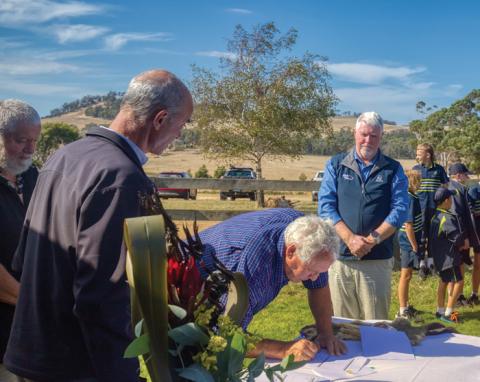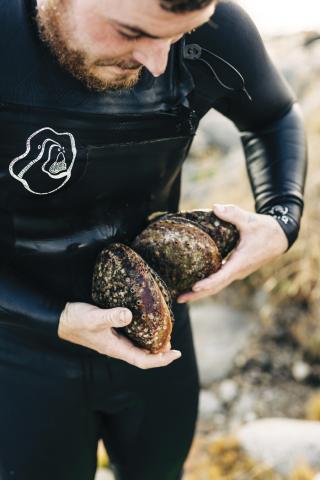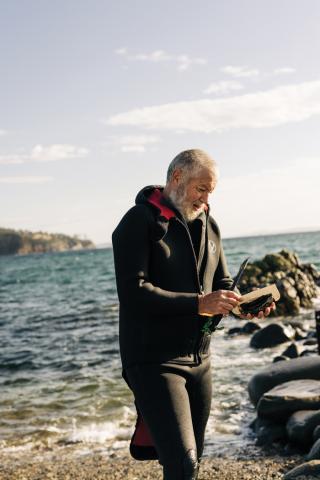With access to the commercial abalone quota, Tasmania’s Indigenous fishers will focus on cultural tourism and sharing food and culture while developing new jobs and skills for their community
By Nicole Baxter
Tasmanian Aboriginal people now hold rights under Tasmanian legislation to fish for abalone and profit from their catch.
In March 2022, an agreement was signed at a ceremony on Aboriginal land at Murrayfield on Bruny Island that enables the Land and Sea Aboriginal Corporation of Tasmania to fish 40 state-owned abalone quota units under a three-year lease.
Since 2008, the Tasmanian Government has put these abalone units up for tender, but they will now form part of the state’s Aboriginal fishery. The agreement on the quota was reached in conjunction with investment from the national Indigenous Land and Sea Corporation. The 40 units equate to an allowable annual catch of about 10 tonnes of abalone.
Tasmanian Primary Industries and Water Minister Guy Barnett says associated fisheries rules will still apply, and the agreement means Tasmanian Aboriginal people will have long-term access to the abalone fishery to develop cultural and commercial fishing activities that have a local, national and international benefit.
“At a local level, this agreement will create nine full-time equivalent direct and indirect jobs enabling Tasmanian Aboriginal people to gain skills and experience that will provide new pathways for career, culture and business development, including meeting the demand for Indigenous produced abalone,” Guy says.
Assistant Minister for Forestry and Fisheries Senator Jonathon Duniam says the Australian Government is committed to continuing to pursue closer, meaningful engagement with Aboriginal fishers into the future.
“The history of Aboriginal and Torres Strait Islander fishing in Australia is rich, and the signing of the abalone agreement will allow for this long and proud tradition of Aboriginal fishing to continue well into the future,” he says.


Signing the abalone agreement is Land and Sea Aboriginal Corporation of Tasmania Director Rodney Dillon, witnessed by Minister for Primary Industries Guy Barnett and Land and Sea Aboriginal Corporation of Tasmania Director Rob Anders. Photo: NRE Tas
Research background
Paving the way for the signing of the agreement was 50 years of advocacy by a range of people including Emma Lee, Associate Professor in Indigenous Leadership at Swinburne University of Technology. Emma has also conducted six years of research, starting in early 2017 with an FRDC project looking at the barriers and opportunities for establishing a market for cultural fisheries in Tasmania.
“But because we’re Aboriginal people and we know how to stretch a dollar and an idea, having a poke around in the theory wasn’t enough. We actually went out and established a market,” Emma says.
The first part of her project ‘Wave to Plate – establishing a market for cultural fisheries in Tasmania’ laid the groundwork. This included ensuring that Aboriginal Elders and their knowledge is respected, and that sea country is sustainably managed for future generations.
The second part of ‘Wave to Plate’ involved testing the appetite in Tasmania for cultural fisheries at a restaurant at Eaglehawk Neck.
Emma’s strategy was to bring together Tasmanian Aboriginal people and representatives from the government, universities, marine research, food sector specialists and catering experts to road test local diners’ appetites for eating Indigenous wild-caught seafood.
“We were able to serve cultural catch abalone while we held a fisheries workshop,” she says. “The workshop lunch demonstrated how network chains can provide opportunities to improve employment and business acumen together with increasing pride in recovery, or continuance, of cultural practices.”
The third part of ‘Wave to Plate’ was to trial cultural fisheries with commercial partners and test the public’s appetite for the concept.
Hospitality Design Consultant and Food Curator Jo Cook attended the fisheries workshop at Eaglehawk Neck and later met with Emma to establish the Palawa Fire Pit at the 2018 Dark Mofo Winter Feast, a series of food stalls and food experiences.


Indigenous fisher Trent Prouse Photo: Adam Gibson
Shared story
“Emma and I developed a ticketed program that she used as part of her research to show that people were interested not only in eating cultural catch but also in hearing the story
around it,” Jo says.
“She developed an amazing program of people including Uncle Rodney Dillon to speak and I organised the chefs who prepared a menu around the cultural catch of abalone.
“It sold out every night over seven nights and was a really amazing experience.”
Jo says that the abalone and its story will provide a valuable experience that will be highly sought after locally.
“I recommended that they don’t export the product but build cultural experiences so people can come to Tasmania to eat the abalone,” she says. “There will be a huge amount of interest because we rarely see Tasmanian abalone in restaurants because so much of it is exported.”
Emma says the Land and Sea Aboriginal Corporation of Tasmania hopes to value-add to local restaurants and hospitality venues while building the relationship between Aboriginal people and other Tasmanians through a meal.
“We also want to look at the social impact of fisheries and be able to build a cradle-to-the-grave sea country program so that our young people have pathways to employment, businesses and social enterprise, rather than the jail and fail model for our young people that they face,” Emma says.


Rob Anders Photo: Adam Gibson
Social impact
“We want to end juvenile justice interventions by developing a market for cultural fisheries. We do that by working with the people who help us succeed and continue that reciprocity.
“We are looking at creating nine jobs for Aboriginal Tasmanian people over the next two years as a starting position and we look to increase that as we replicate our success in our abalone model for social impact in sea country.”
Emma says that the board of the Land and Sea Aboriginal Corporation of Tasmania is starting to explore what will come next, and cultural food experiences are on the menu.
“We know there is a massive appetite for cultural provenance and local seafood to go together to value-add what fisheries and food tourism can be for our future generations,” she says.
Indigenous Elder Uncle Rodney Dillon is Chair of the Land and Sea Aboriginal Corporation of Tasmania. He hopes to gather some more quota units, so the six Aboriginal organisations involved in the governance of the corporation can earn an independent income and will not need to live off government funds.
“We want to consolidate what we’ve got and build a bit of wealth … but … the fish should be eaten here and not all sent overseas,” he says.
“This is our prize food and we should be looking at tourism with some of our local Aboriginal people to do that.”
Uncle Rodney wants to help other Aboriginal organisations to also become licensed.
“Not just here in Tasmania, but also in New South Wales and South Australia,” he says. f
More information
Emma Lee - ejlee@swin.edu.au





